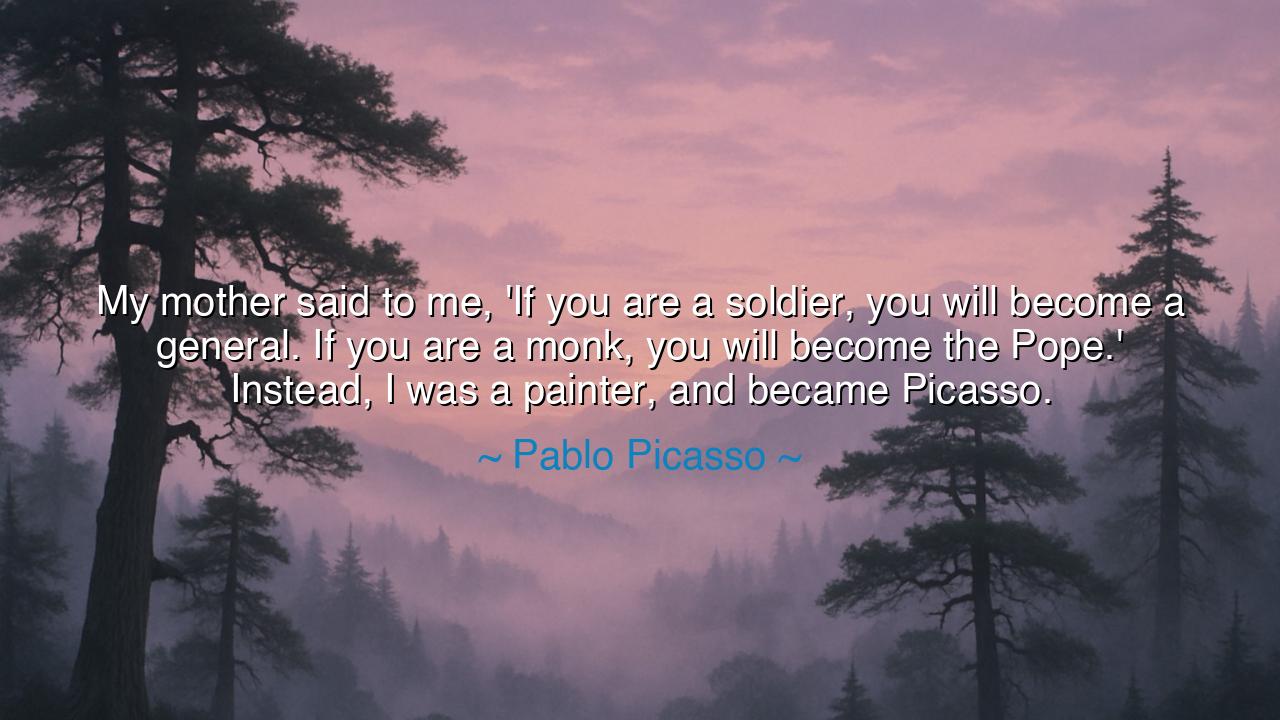
My mother said to me, 'If you are a soldier, you will become a
My mother said to me, 'If you are a soldier, you will become a general. If you are a monk, you will become the Pope.' Instead, I was a painter, and became Picasso.






“My mother said to me, ‘If you are a soldier, you will become a general. If you are a monk, you will become the Pope.’ Instead, I was a painter, and became Picasso.”
Thus spoke Pablo Picasso, the titan of modern art, whose hands reshaped the vision of the world. His words are not a boast, but a revelation of destiny, belief, and the mysterious power of a mother’s faith. In this declaration lies the eternal dance between nurture and genius, between the love that molds and the will that conquers. Picasso’s mother saw in her son not what he was, but what he could become—a limitless potential waiting for expression. And so her words became prophecy, for faith, when spoken with love, plants seeds that bloom even against the hardest stone.
In the ancient world, such faith was seen as divine sight. The Greeks called it daimon, the inner spirit that drives a soul toward greatness. Picasso’s mother, like a seer of old, did not command her son’s path—she blessed it. Her words were the wind that filled his sails, and her confidence became his courage. For every soul, no matter how gifted, requires the breath of another to awaken its flame. Thus, when she told him he would become not merely good, but extraordinary, she gave him permission to believe in the impossible.
There are echoes of this in the story of Alexander the Great, whose mother, Olympias, whispered from his youth that he was born of gods and destined for empire. Whether truth or legend, the belief was enough. Alexander conquered worlds not only with the sword, but with conviction—the same sacred force that Picasso’s mother gave him. Both sons were shaped by the vision of their mothers, and both proved that when faith meets will, even mortals may touch eternity.
Yet Picasso’s words carry a deeper wisdom. When he says, “I was a painter, and became Picasso,” he reveals that identity is not a gift, but a creation. The world did not hand him greatness; he forged it through relentless work, through defiance of form and fear. His mother’s faith may have been the spark, but it was discipline, passion, and vision that became the fire. To “become Picasso” was to transcend the limits of craft and touch the realm of the eternal artist—to see the unseen, to shape chaos into beauty, to redefine what art could be.
The ancients would have called such a life areté—excellence not born of fortune, but of alignment between purpose and spirit. Picasso teaches that greatness is not a station, but a becoming. Each brushstroke, each struggle, each refusal to bow to convention was a declaration: I am more than my circumstance; I am the creator of my destiny. His life reminds us that faith alone is the seed, but action is the sun that makes it bloom.
In our own time, how many live beneath the shadow of doubt, forgetting the sacred power of self-belief? The lesson of this quote is clear: accept the blessing of those who love you, but fulfill it through your own labor. Let no fear or failure silence the song within you. Whether you are a teacher, a craftsman, a writer, or a dreamer, become your own masterpiece. For to “become Picasso” is not to become famous—it is to become whole, to bring forth your truest self without apology or hesitation.
If your mother, your mentor, or your own inner voice once told you that you were destined for greatness, believe it. But know that destiny waits for no idle hand. Rise, as Picasso did, with courage in your heart and purpose in your soul. Paint your life with boldness. Shape your world until it bears your name. And when the day comes that others ask who you are, let your life itself be the answer: “I was a dreamer—and became myself.”






AAdministratorAdministrator
Welcome, honored guests. Please leave a comment, we will respond soon